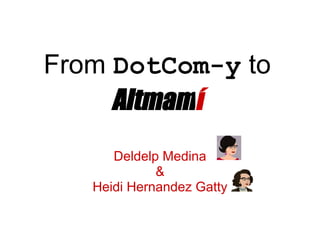From Dot-com-y to Altmami
- 1. From DotCom-y to Altmam¨ª Deldelp Medina & Heidi Hernandez Gatty
- 2. Why isn¡¯t our generation of Latinos considered exceptional? ¡ñ Who is our generation? ¡ð Alphabet soup of letters: X, Y, ? ¡ð Digi-Latinos ¡ñ Invisible in terms of: ¡ð Leadership: not leading peers, leading up or down ¡ð Political clout: where are we engaged politically and why aren't we cultivated by national organizations ¡ð Economic power ¡ñ And yet, we are exceptional
- 3. How do we become visible in the media landscape without being reduced to the lowest common denominator? ¡ñ Invisible Girls ¡ñ Don't Rock the boat ¡ñ Perfect Brown
- 4. How will bi-culturalism replace bi- lingualism for our children; what can we gain and what are we afraid to lose? ¡ñ Language first, food last ¡ñ Language as a virus ¡ñ Salad is delicioso and nutricioso
- 5. Are we the wrong kind of brown when it comes to entrepreneurship? ¡ñ What is the right kind of brown? ¡ð ¡ð White collar vs. Brown collar ¡ð The "muslim problem" is not an immigration problem ¡ñ Why is our brown a smear on America? ¡ð Violent...yet servile
- 6. Why do we hold onto our cultural baggage: racism, misogyny & homophobia? ¡ñ Mucho macho, hombre! ¡ð The Sammy Sosa effect ¡ð Miss Culito ¡ð Solo mi (gay) familia is ok





